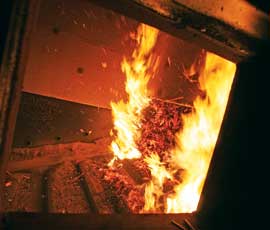Renewable Heat Incentive scheme to open

As the Renewable Heat Incentive scheme opens for applications, Carter Jonas head of energy and marine team Andrew Watkin explains what it’s all about
What is the Renewable Heat Incentive?
The RHI is a government scheme that provides financial support to renewable heat generators and producers of biomethane for a 20-year period.
The scheme will be administered by Ofgem and technologies covered in the non-domestic sector include solid biomass, municipal solid waste including combined heat and power, ground- and water-source heat pumps, deep geothermal, solar thermal (less than 200kWth) and injection of biomethane into the grid and biogas combustion less than 200kWth (except from landfill).
When does it start?
The RHI is being introduced in two phases.
Phase one opens for applications today (30 September) and targets the non-domestic sector, which includes the industrial and commercial sectors, not-for-profit organisations and communities. This includes small businesses, hospitals, schools and district heating schemes (one boiler serving multiple properties). The government suggest this area “will provide the vast majority of the renewable heat to meet targets”.
Phase two begins next autumn for single domestic installations. As a short-term measure, Renewable Heat Premium Payments have been introduced, aimed at domestic properties off the gas grid currently using fossil fuel heating. The scheme allows householders to claim a one-off payment towards the cost of installing an eligible renewable heat technology. The RHPP is administered by the Energy Saving Trust. It opened for applications on 1 August 2011 and runs until 31 March 2012.
How can farmers benefit?
Farmers can potentially benefit from either phase one or phase two of the RHI, depending on circumstances. As we understand it, a scheme serving, say, the main house and an on-farm office complex could be eligible under the non-domestic criteria. DECC suggests that an example of a district heating scheme is one boiler serving multiple homes. Any applicant needs to be mindful that if he/she were to install, say, individual heat pumps in multiple properties this would classified as domestic installations and would not be eligible under phase one.
For phase one installations the RHI will be paid quarterly over a 20-year period based on metered generation. Payments are shown below:
How’s it regulated?
Ofgem administers the RHI and will produce documentation that sets out the requirements for a project to meet their eligibility criteria which they assess, as well as making the payments to acceptable schemes and ensuring compliance.
What if I’ve already installed renewable heat kit?
For a non-domestic situation, if the equipment is deemed eligible and was installed after 15 July 2009, it will be supported under the RHI. But if you claimed a grant towards the scheme and try to claim the RHI, there would be an issue. For eligible technology installed between 15 July 2009 and the date the RHI regulations come into force, there should be an option to pay back the grant and then receive the RHI.
For domestic installations installed under the RHPP, the generator can apply for RHI support when it is extended to the domestic sector, subject to eligibility criteria.
What’s the catch?
For installations up to and including 45kWth, the equipment and installer must be certified under the Micro-generation Certification scheme or equivalent.
The plant must be new when installed and the heating system to which the installation provides heat must use a liquid or steam as heat delivery medium.
Will payments be cut like Feed-in Tariffs?
Outline RHI details indicate payment levels will be adjusted annually in line with inflation for accredited projects. Tariff levels can change over time and new tariffs will be applied to anyone joining the scheme. Degression will be built into the RHI as part of phase two.
We feel the RHPP is a short-term pilot scheme, as households have to provide feedback on installations and their use to DECC. It is worrying the government doesn’t appear to have undertaken significant due diligence in the sector and this begs the question of whether they could call a fast-track RHI review, along similar lines to FiTs.
See the latest developmentsFind out more
http://www.decc.gov.uk
http://www.ofgem.gov.uk
http://www.legislation.gov.uk/
http://www.direct.gov.uk/en/index.htm
